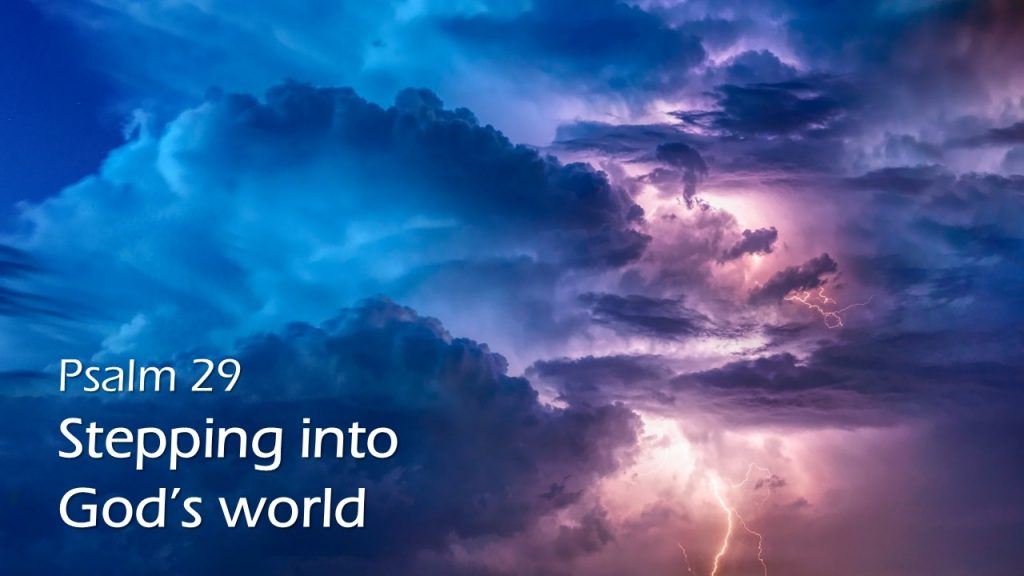When we began examining Psalm 29 in the previous post, we noticed that the psalmist begins with a glimpse into the throne room of God in heaven. He speaks to the heavenly beings (or “mighty ones”) around God’s throne and urges them to continue worshipping God and giving Him glory. Then the psalm moves from the heavenly realm to the earth.
God’s Glory on Earth
Have you noticed that the psalmist describes the effects of the voice of the Lord on earth in similar terms to how Isaiah, Ezekiel and John described the majesty and power of God on His throne in heaven? – with lightening, thunder and shaking.
He makes Lebanon leap like a calf,
Sirion like a young wild ox.
The voice of the Lord strikes
with flashes of lightning.
The voice of the Lord shakes the desert;
the Lord shakes the Desert of Kadesh.
The voice of the Lord twists the oaks
and strips the forests bare.
And in his temple all cry, “Glory!”
Psalm 29:6-9
The psalms are very poetic and use picture-language to express ideas. Here, the psalmist says the mountains “leap like a calf” or “like a young wild ox” – in other words, the mountains shake as though in an earthquake, at the voice of the Lord. God’s voice doesn’t just cause the mountains to shake, but it also shakes the desert. In fact, from Lebanon in the north to Kadesh in the south, the whole of Israel is described as being shaken by the voice of the Lord.
Everything and everyone in heaven and earth cannot help but cry out “Glory!” Imagine this. In the Bible, glory is most often associated with God as ruler and sovereign king (eg. king of glory; crown of glory; throne of glory; lord of glory). As Lord and King He deserves all praise, honour and glory.
God’s Glory in the Church
The Apostle Paul reflects the vastness of this proclamation of glory in Ephesians 3:20-21 where he says, “Now to him who is able to do immeasurably more than all we ask or imagine, according to his power that is at work within us, to him be glory in the church (ie. the body of Christ) and in Christ Jesus (ie. the head of the body) throughout all generations (ie. on earth), for ever and ever (ie. in heaven)! Amen.” (bold and words in brackets are mine)
To Him be glory in the church! What does it mean for you personally to give God glory? As a member of His body, the church, how do these verses from Psalm 29 and Eph 3 draw you to join with all in His temple crying out “Glory!”?
God is the One who has been sitting on his throne for all eternity. He is creator and Lord of all that exists. He sits “enthroned as King forever.” Psalm 29 proclaims that the One who reigns in heaven is also the One who reigns on earth.
The Lord sits enthroned over the flood;
the Lord is enthroned as King forever.
The Lord gives strength to his people;
the Lord blesses his people with peace.
Psalm 29:10-11
In the final verse, the psalmist reminds us that the amazing strength/might/power of God is also given to His people. Strength is one of the attributes of God – He is all-powerful (or omnipotent). And His strength is given to US! The all-powerful God who is enthroned forever, whose voice thunders and shakes the earth, gives us His strength. Wow!
God also blesses his people with “peace.” The word “peace” is the Hebrew word “Shalom.” This is a beautiful word that incorporates completeness, fulfilment, wellbeing and wholeness – so much more than the English word “peace” can express. Shalom can only be found in God Himself. In fact, everything we need can only ever be found in Him.
God’s World Becomes Our World
Did you also notice there is no “I” in this psalm? Everything is fully focused on God, His splendour and majesty; the power of His voice; His enthronement as Lord and King; and His blessing on His people. This psalm encourages us to really see God for who He is – and to adjust our perspective accordingly. To not try and fit Him into “our” world – because we can’t! – but to join Him in His.
This psalm also shows us that the heavenly realm is not so transcendent (or other-worldly) that it is separated from the things of this world. In fact, “God’s world” fully embraces and encompasses everything on earth. The psalm moves seamlessly from heaven’s throne room (verses 1-2) to “the waters” of creation (verse 3), then more personally to the land of Israel where the psalmist resides (verses 5-8). The movement of the psalm is from heaven to earth; from the whole of creation to one nation; from north to south; from mountains to desert; and from majesty to “Shalom”.
How has this psalm spoken to you? I hope that, like me, your perspective has been shifted and, like the psalmist, all you can do is worship and cry out “Glory!”





